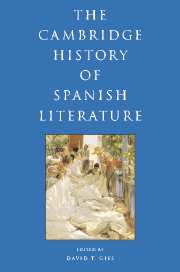Book contents
- Frontmatter
- I INTRODUCTION
- II HISTORY AND CANONICITY
- III THE MEDIEVAL PERIOD
- 2 Medieval Spanish literature in the twenty-first century
- 3 Beginnings
- 4 The poetry of medieval Spain
- 5 Medieval Spanish prose
- 6 The medieval theatre: between scriptura and theatrica
- IV EARLY MODERN SPAIN: RENAISSANCE AND BAROQUE
- V THE ENLIGHTENMENT AND NEOCLASSICISM
- VI THE FORGING OF A NATION: THE NINETEENTH CENTURY
- VII THE MODERN, MODERNISMO, AND THE TURN OF THE CENTURY
- VIII TWENTIETH-CENTURY SPAIN AND THE CIVIL WAR
- IX IN AND OUT OF FRANCO SPAIN
- X POST-FRANCO SPANISH LITERATURE AND FILM
- Bibliography
- Index
- References
3 - Beginnings
from III - THE MEDIEVAL PERIOD
Published online by Cambridge University Press: 28 March 2008
- Frontmatter
- I INTRODUCTION
- II HISTORY AND CANONICITY
- III THE MEDIEVAL PERIOD
- 2 Medieval Spanish literature in the twenty-first century
- 3 Beginnings
- 4 The poetry of medieval Spain
- 5 Medieval Spanish prose
- 6 The medieval theatre: between scriptura and theatrica
- IV EARLY MODERN SPAIN: RENAISSANCE AND BAROQUE
- V THE ENLIGHTENMENT AND NEOCLASSICISM
- VI THE FORGING OF A NATION: THE NINETEENTH CENTURY
- VII THE MODERN, MODERNISMO, AND THE TURN OF THE CENTURY
- VIII TWENTIETH-CENTURY SPAIN AND THE CIVIL WAR
- IX IN AND OUT OF FRANCO SPAIN
- X POST-FRANCO SPANISH LITERATURE AND FILM
- Bibliography
- Index
- References
Summary
Genesis and chronicles
At the beginnings of literary histories lie the most alluring questions. We want to know all about what we call the origins of the tradition whose story is about to be told. Few start with “once upon a time” and yet nearly all are tempted down that road marked “sources” or “birth” or “genesis,” even when we know that it is a path that, nearly by definition, can have nothing like an unambiguous endpoint or resolution. Why do we persist in our scholarly tradition’s most quixotic quest, the search for that grail, that moment of birth, that earliest text or, as it is often called, “monument”? Why do we persist, even when we know (for we ourselves teach this) that what does survive from the earliest sources, in relatively remote times, may be largely a trick of history, and may bear only an accidental relationship to what there really was? Why do we not begin, more simply and cleanly, in some indisputable medias res and from there go bravely forward into the future, rather than backwards to where the question of the source of that particular river may lie? Why are we most insistent of all, when writing about those periods often charmingly called by poetic names (such as the “springtime” of our literature), on the need to clarify what we call “influences” – and what can that mean other than the poetic company that poets kept? Why are the histories of medieval literatures (whether free-standing or, as here, as the origins stories of later literatures) so consistently our versions of the story of Adam and Eve, sometimes down to and including quasi-biblical titles such as “the creation of literature in Spanish”?
- Type
- Chapter
- Information
- The Cambridge History of Spanish Literature , pp. 58 - 74Publisher: Cambridge University PressPrint publication year: 2005
References
- 1
- Cited by

